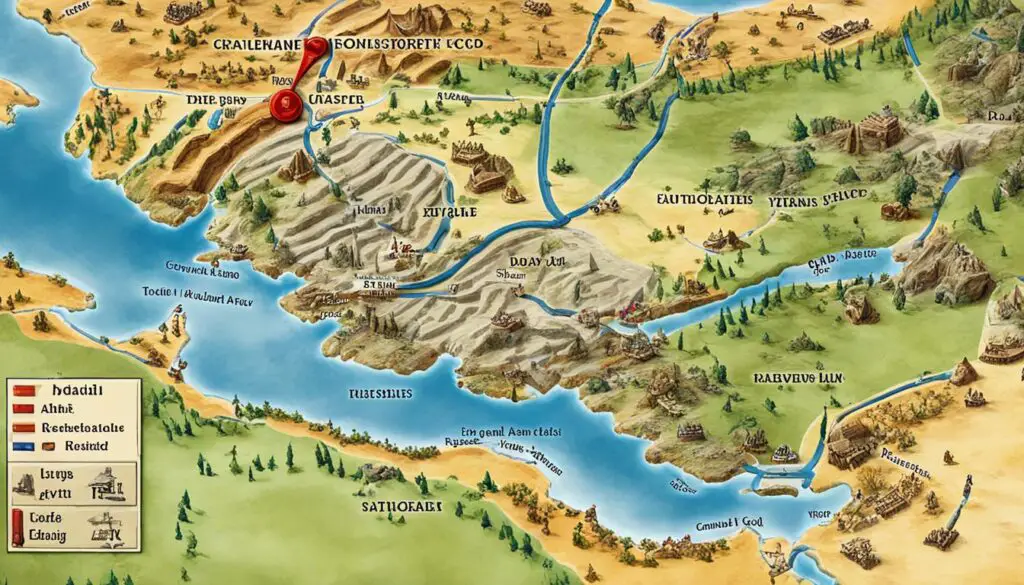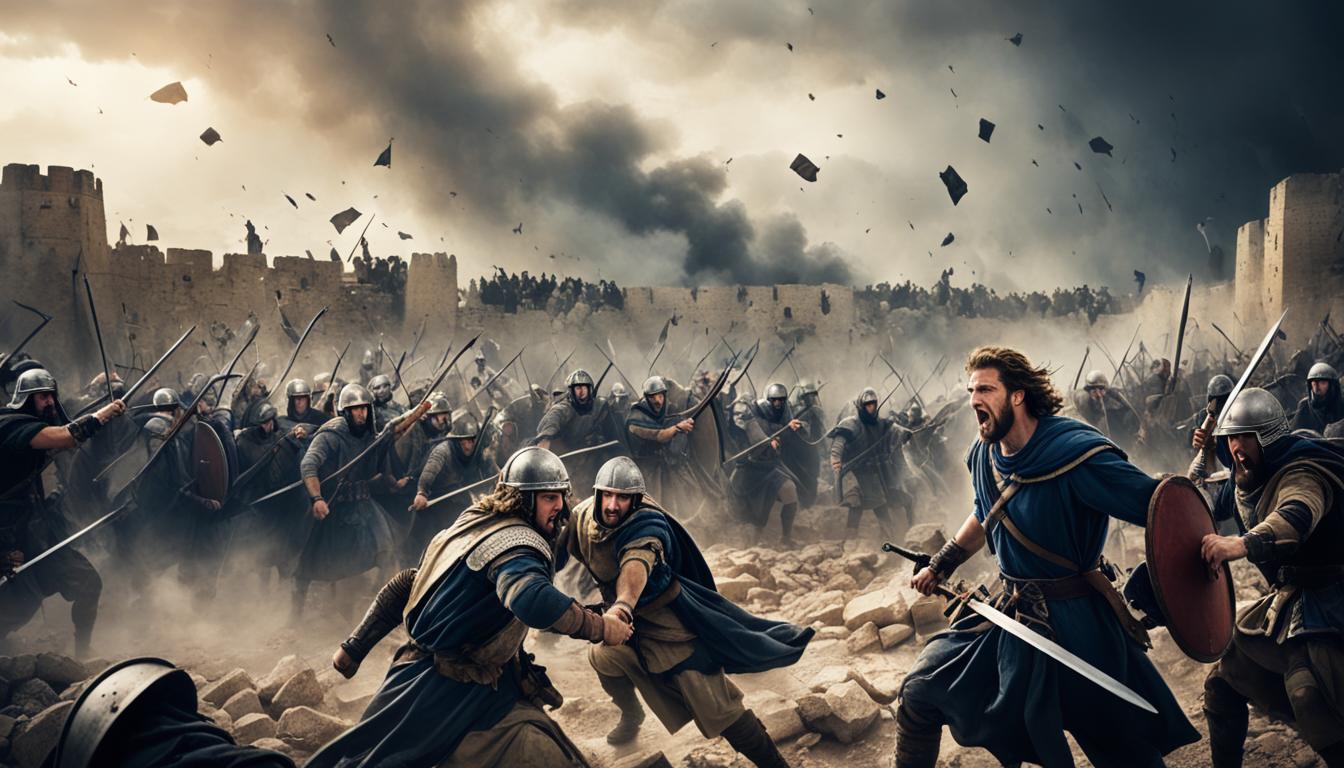The Bible contains numerous accounts of wars and battles, showcasing stories of faith, courage, and divine intervention. From Abraham to King David, from the Israelites’ conquest of Jericho to the wars between Israel and Judah, these battles have left a lasting impact on religious and historical narratives.
Key Takeaways:
- Biblical warfare is depicted through stories of battles and wars in the Bible.
- These battles exemplify courage, faith, and divine intervention.
- Prominent figures such as Abraham and King David feature in these battles.
- Notable battles include the conquest of Jericho and the wars between Israel and Judah.
- These battles have had a significant impact on religious and historical narratives.
Battles from Abraham to Israel’s Conquest
The Bible tells of several significant battles from the time of Abraham to the Israelites’ conquest of the promised land. These battles, filled with faith, bravery, and divine intervention, are integral to the biblical narrative.
Abraham’s Victory over the Armies of Shinar
One notable battle involves Abraham, the father of many nations. In Genesis 14, Abraham successfully leads a coalition of forces to rescue his nephew Lot, who had been captured by an alliance of kings from Shinar, Ellasar, Elam, and Goiim.
“Then Abram brought back all the goods, and also brought back his brother Lot and his goods, as well as the women and the people.” – Genesis 14:16
The Israelites’ Struggle against the Amalekites
During their journey through the wilderness, the Israelites faced the Amalekites in a battle recorded in Exodus 17. Joshua led the Israelite army, while Moses interceded for them on a hill overlooking the battlefield. Through divine intervention, the Israelites emerged victorious.
Marches on Jericho and Ai
Two prominent military campaigns in the conquest of Canaan were the battles of Jericho and Ai, as described in the book of Joshua. These battles were significant tests of faith for the Israelites, demonstrating God’s power and guidance in their quest to possess the promised land.
“So the people shouted when the priests blew the trumpets. And it happened when the people heard the sound of the trumpet, and the people shouted with a great shout, that the wall fell down flat. Then the people went up into the city, every man straight before him, and they took the city.” – Joshua 6:20
“And the Lord said to Joshua, ‘Do not fear and do not be dismayed. Take all the fighting men with you, and arise, go up to Ai. See, I have given into your hand the king of Ai, and his people, his city, and his land.’” – Joshua 8:1
These battles from Abraham to the Israelites’ conquest of the promised land demonstrate the intersection of faith and military campaigns within the biblical narrative. They serve as reminders of God’s faithfulness and the importance of trust in times of conflict.
Battles of the Kingdom
The period of the Israelite monarchy was marked by numerous battles with neighboring powers, particularly the Philistines. These battles played a pivotal role in shaping the destiny of the Israelite kingdom and are significant in biblical history and narratives. The conflicts included the capture of the Ark of the Covenant, David’s legendary victory over Goliath, and the wars fought to establish Jerusalem as the capital of Israel.
One of the most famous battles during this period was David’s encounter with Goliath, a Philistine giant. Despite being heavily outnumbered and facing a formidable opponent, David’s unwavering faith in God led him to triumph over Goliath with a single stone from his sling. This iconic battle showcases the power of courage, reliance on divine intervention, and the triumph of the underdog.
“…You come against me with sword and spear and javelin, but I come against you in the name of the Lord Almighty…”
Another notable conflict was the capture of the Ark of the Covenant from the Philistines. The Ark, believed to hold the tablets of the Ten Commandments, represented the symbol of God’s presence among the Israelites. After being captured by the Philistines in an initial battle, the Ark brought calamity to the Philistine cities. Eventually, it was returned to the Israelites, marking a significant victory and reaffirming the divine protection of their faith.
In their pursuit to establish Jerusalem as the capital, King David and his forces engaged in various wars against the Philistines and other neighboring powers. Eventually, David captured Jerusalem and made it his capital, solidifying the Israelite kingdom and fulfilling a significant prophecy.
The battles of the kingdom, particularly those against the Philistines, not only shaped the political landscape of ancient Israel but also served as powerful symbols of faith, strength, and the ultimate triumph of God’s chosen people.

Battles of the Kingdom
| Battle | Significance |
|---|---|
| Capture of the Ark of the Covenant | Symbolic victory and reaffirmation of divine protection |
| David vs. Goliath | Showcase of courage, reliance on God, and triumph of the underdog |
| Wars to establish Jerusalem as the capital | Political consolidation and fulfillment of prophecy |
Battles of the Divided Kingdoms, Judah and Israel
After the death of King Solomon, the Israelite kingdom split into two separate entities: Israel and Judah. These divided kingdoms found themselves engaged in frequent battles, as they sought to establish their dominance and protect their territories. The battles between Israel and Judah were not just conflicts between two nations, but often involved alliances with other regional powers, as each kingdom sought to gain the upper hand.
However, these battles ultimately led to the fall of Israel at the hands of the Assyrians. The powerful Assyrian Empire invaded Israel, besieging its cities and ultimately capturing its capital, Samaria, in 722 BCE. This marked the end of the northern kingdom of Israel and the assimilation of its population into the Assyrian Empire.
Judah, on the other hand, faced invasions and sieges but managed to survive for a longer period. The kingdom of Judah had its share of conflicts, as it faced invasions from regional powers such as Assyria and later Babylon. However, Judah’s survival can be attributed to strong leadership, alliances, and fortified cities.
“And he carried away all Jerusalem and all the officials and all the mighty men of valor, 10,000 captives, and all the craftsmen and the smiths. None remained, except the poorest people of the land.”
– 2 Kings 24:14
The fall of Israel and the survival of Judah had significant consequences for the Israelites. It marked a turning point in their history, as they were dispersed and assimilated into different empires, ultimately leading to the Babylonian exile.
| Kingdom | Battles | Alliances |
|---|---|---|
| Israel | Battles against Assyria | None |
| Judah | Sieges by Assyria and Babylon | Alliances with Egypt and other regional powers |
The fall of Israel and the survival of Judah during this period of division and conflict shaped the future of the Israelite people, their religious practices, and their relationship with God.
Key Takeaways:
- After the death of King Solomon, the Israelite kingdom split into Israel and Judah.
- Battles between Israel and Judah often involved alliances with regional powers.
- The fall of Israel occurred at the hands of the Assyrians in 722 BCE.
- Judah faced invasions and sieges but managed to survive for a longer period.
- Leadership, alliances, and fortified cities were crucial to Judah’s survival.

Battles of the Christian Era
The Christian era in the Bible is marked by spiritual warfare, where believers engage in battles on a spiritual level rather than physical conflicts. The New Testament emphasizes the ongoing struggle between good and evil, illuminating the reality of spiritual warfare in the lives of believers. It is through the power of God and the guidance of the Holy Spirit that believers are equipped to face these invisible battles.
In the Bible, the battle of Armageddon is a significant event prophesied to occur at the end times. This battle represents the ultimate showdown between the forces of evil and the righteous. It is a symbolic depiction of the cosmic battle between God and Satan, where evil will ultimately be defeated, and God’s kingdom will triumph over all.
“For our struggle is not against flesh and blood, but against the rulers, against the authorities, against the cosmic powers over this present darkness, against the spiritual forces of evil in the heavenly places.” – Ephesians 6:12
Spiritual Warfare in the New Testament
In the New Testament, the concept of spiritual warfare is prominently featured in various passages. The apostle Paul, in his letter to the Ephesians, encourages believers to put on the armor of God to withstand the schemes of the devil and to stand firm in faith and truth.
- Ephesians 6:11-13 – “Put on the whole armor of God, that you may be able to stand against the schemes of the devil. For we do not wrestle against flesh and blood, but against the rulers, against the authorities, against the cosmic powers over this present darkness, against the spiritual forces of evil in the heavenly places. Therefore, take up the whole armor of God, that you may be able to withstand in the evil day, and having done all, to stand firm.”
- 2 Corinthians 10:3-5 – “For though we walk in the flesh, we are not waging war according to the flesh. For the weapons of our warfare are not of the flesh but have divine power to destroy strongholds. We destroy arguments and every lofty opinion raised against the knowledge of God and take every thought captive to obey Christ.”
These verses emphasize the spiritual battles believers face and the importance of relying on God’s strength and equipping to overcome the forces of evil.
The Battle of Armageddon
The battle of Armageddon is a future apocalyptic event mentioned in the book of Revelation. It represents the final battle between the forces of good and evil. The name “Armageddon” is derived from the Hebrew term “Har-Magedon,” which means “Mount Megiddo.” Although it is uncertain whether Mount Megiddo itself will be the literal location of the battle, the name symbolizes a place of great significance.
According to the book of Revelation, the battle of Armageddon will culminate in the ultimate defeat of the evil forces and the establishment of God’s kingdom on earth. It signifies the final victory of Jesus Christ over Satan and the completion of God’s redemptive plan for humanity.

| Key Elements of the Battle of Armageddon | Description |
|---|---|
| Battle between Good and Evil | The battle of Armageddon represents the ultimate clash between the forces of good, led by Jesus Christ, and the forces of evil, led by Satan and his allies. |
| Divine Intervention | God’s divine intervention plays a crucial role in the battle, leading to the defeat of the evil forces. |
| Final Judgement | The battle of Armageddon is closely associated with the final judgement of all humanity, where each person will be held accountable for their actions. |
| Establishment of God’s Kingdom | After the battle, the reign of evil will be completely eradicated, and God’s kingdom will be fully realized on earth. |
While the battle of Armageddon is described in symbolic and metaphorical terms, its underlying message is clear: evil will be defeated, and God’s righteousness will prevail.
Merneptah conquers Israel?
In one of the ancient Egyptian steles, the renowned pharaoh Merneptah claimed to have conquered “Israel.” This mention in the stele stands as the earliest known record of the name “Israel” outside of the Bible. Although the stele’s details are limited, its significance lies in establishing the existence of Israel as a nation during that historical period.
While the battles in the Bible provide a rich tapestry of narratives, the conquest of Israel by Merneptah offers a glimpse into the geopolitical landscape of ancient times. The stele’s inscription provides valuable evidence for the presence of Israel as a formidable entity in the region.
“And Israel is laid waste, its seed is not.”
The mention of Israel in the stele implies that it was a recognized and significant power in the eyes of ancient Egypt. This historical context sheds light on the historical accuracy and reliability of the biblical accounts of battles and conflicts. It establishes a connection between the biblical narratives and external historical sources.
The conquest of Israel by Merneptah represented a pivotal moment in the ancient Near East, possibly affecting the course of regional politics and power dynamics. While further research and archaeological discoveries continue to deepen our understanding of this era, the mention of Israel in Merneptah’s stele stands as a noteworthy historical artifact in the study of biblical battles and ancient civilizations.

Archaeological Exploration and Interpretation
Archaeologists have long been intrigued by the historicity of biblical battles and the conquest of Israel. The discovery of the Merneptah Stele adds another layer of investigation into this fascinating field of study. Scholars analyze the stele’s inscription, its associated context, and other archaeological evidence to piece together a comprehensive understanding of the events and societies of that time.
While the stele does not provide a detailed account of the battles or the precise extent of the conquest, its mention serves as a valuable corroborative evidence for the historicity of ancient Israel. This inscription reinforces the biblical narratives surrounding battles fought during that period and expands our understanding of the geopolitical landscape in which these conflicts took place.
Comparative Analysis: Battles in the Bible and Other Historical Sources
By comparing the battles described in the Bible with other historical sources, such as the Merneptah Stele, scholars can gain new perspectives on ancient conflicts. This comparative analysis allows for a more nuanced understanding of the events and serves as a means of validating the historical veracity of biblical accounts.
Through interdisciplinary research and collaboration between historians, archaeologists, and biblical scholars, we continue to uncover new insights into the battles in the Bible and their significance in shaping ancient history. The Merneptah Stele stands as a significant piece of evidence that supports the existence of Israel as an influential nation during the biblical era.
Escape from Egypt
The Book of Exodus tells the incredible story of the Israelites’ escape from bondage in Egypt. One of the most famous and dramatic events during this time is the account of the Red Sea crossing. According to the biblical narrative, as the Israelites fled from the pursuing Egyptian army, Moses stretched out his hand over the sea, and through divine intervention, the waters parted, creating a dry path for the Israelites to cross. Once the Israelites had safely crossed, the waters returned, engulfing the Egyptians and ensuring their defeat.
This iconic event has captivated the imagination of believers for centuries. While some scholars debate the historicity of the Red Sea crossing, the story serves as a powerful symbol of liberation from oppression and divine deliverance. It represents a turning point in the history of the Israelites, marking the transition from slavery to freedom and the beginning of their journey to the Promised Land.

“Behold, I am doing a new thing; now it springs forth, do you not perceive it? I will make a way in the wilderness and rivers in the desert.” – Isaiah 43:19
The story of the escape from Egypt and the Red Sea crossing continues to inspire and encourage people of faith. It reminds us that even in the face of seemingly insurmountable obstacles, God can make a way where there seems to be no way. It serves as a reminder to trust in Divine providence and have faith in God’s faithfulness.
Battle of Jericho
The battle of Jericho is one of the most well-known stories in the Bible. The Israelites, under the leadership of Joshua, marched around the city for seven days before the walls miraculously collapsed, allowing the Israelite army to capture the city. While the archaeological evidence for this battle is debated, the story serves as a symbol of God’s power and faithfulness.
Battle of Ai
The book of Joshua in the Bible narrates the account of the Battle of Ai, which took place after the Israelites’ triumph at Jericho. In this significant battle, the Israelite army employed a well-executed strategy that led to their victory over the city of Ai.
According to the biblical narrative, Joshua, the leader of the Israelites, received direct instructions from God on how to conquer the city. Initially, the Israelites faced defeat at Ai due to the disobedience of one of their soldiers named Achan, who had taken forbidden plunder from Jericho. However, after dealing with Achan’s disobedience, Joshua sought divine guidance to devise a new plan for conquering Ai.
The strategy involved luring away Ai’s defenders and then launching a surprise attack. Joshua decided to send a small group of soldiers to the rear of the city during the day, attracting Ai’s main forces to chase them. Meanwhile, Joshua positioned the majority of his army in ambush, waiting for the signal to attack.
When the Israelite soldiers at the rear of the city pretended to retreat, the men of Ai pursued them, unknowingly leaving their city vulnerable. At the appointed time, Joshua signaled his forces to launch a surprise assault against Ai. The Israelites overwhelmed the city, capturing it and burning it to the ground.
“…for they will say, ‘They are fleeing before us as at the first.’ So, we will flee before them. Then you shall rise up from the ambush and seize the city, for the Lord your God will give it into your hand.”
The historicity of the Battle of Ai is a topic of debate among archaeologists. No direct archaeological evidence has been found to verify the specific events recounted in the biblical narrative. However, the story serves as a powerful reminder of the importance of strategy and obedience in overcoming adversity.
By employing a cunning plan and adhering to divine guidance, Joshua and the Israelites achieved a decisive victory at Ai, further solidifying their conquest of the Promised Land. The Battle of Ai showcases the significance of both military strategy and trust in God’s guidance in the biblical account of Joshua’s conquest.
| Significance | Lessons Learned |
|---|---|
| The conquest of Ai marked a crucial step in the Israelites’ journey to possess the Promised Land. | Success requires not only military prowess but also meticulous planning and faith in divine guidance. |
| The defeat at Ai and subsequent victory demonstrated the consequences of disobedience and the importance of addressing sin. | Obedience to God’s commands is vital for achieving success and overcoming obstacles. |
| The Battle of Ai underscored the significance of learning from past mistakes and adjusting strategies accordingly. | Adaptability and flexibility are essential for overcoming challenges and achieving victory. |
Battles against the Philistines
In the Hebrew Bible, there are several accounts of battles between the Israelites and the Philistines, highlighting the ongoing struggle for dominance in the region. One of the most renowned encounters is the legendary duel between David, a young shepherd, and Goliath, a giant warrior from the Philistine army.
The story of David and Goliath is an iconic tale of an underdog triumphing against all odds. Armed with only a slingshot and his unwavering faith in God, David defeats Goliath and becomes a symbol of courage and divine protection.
“You come against me with sword and spear and javelin, but I come against you in the name of the Lord Almighty…”
The battles between the Israelites and the Philistines were not limited to this famous encounter. The Philistine city-states, such as Ashkelon and Gath, posed a constant threat to Israelite sovereignty. Archaeological discoveries, including the ancient cemetery in Ashkelon, provide valuable insights into the Philistine culture and their significant role in the biblical narrative.
Philistine Cities and Israelite Conquest
| Philistine Cities | Israelite Conquests |
|---|---|
| Ashdod | Conquered by King Uzziah (2 Chronicles 26:6) |
| Ashkelon | A city the Israelites struggled to control throughout their history |
| Gath | Conquered and occupied by King David (1 Chronicles 18:1) |
| Gaza | Samson’s destructive act against the city (Judges 16:21-30) |
| Ekron | Conquered by King Uzziah (2 Chronicles 26:6) |
These battles against the Philistines played a significant role in shaping the history and destiny of ancient Israel. They reflect the struggle for power, territorial control, and divine protection experienced by the Israelite tribes.
Conclusion
The battles in the Bible are more than just historical accounts; they are powerful stories of faith, bravery, and the intervention of divine forces. While the exact historicity of these battles may be a subject of debate, their significance in shaping religious and historical narratives cannot be denied.
Biblical conflicts such as the conquest of Jericho, the battles of David against the Philistines, and the escape from Egypt showcase the enduring themes of overcoming obstacles, remaining steadfast in faith, and trusting in divine guidance. These stories continue to inspire believers today, offering valuable lessons in courage, resilience, and the power of faith.
The battles in the Bible also contribute to our understanding of ancient history, shedding light on the geopolitical landscape and warfare practices of biblical times. They provide a glimpse into the challenges faced by the Israelites and their struggle to establish and maintain their presence in the region.
Whether interpreted as literal accounts or symbolic representations, these biblical battles serve as a testament to the enduring power and influence of the Bible. They remind us of the importance of historical narratives and the role they play in shaping our religious beliefs, cultural heritage, and understanding of the past.
FAQ
What are some notable battles in the Bible?
Some notable battles in the Bible include Abraham’s victory over the armies of Shinar, the Israelites’ conquest of Jericho and Ai, David’s famous victory over Goliath, and the ongoing spiritual battle between good and evil in the Christian era.
Did the battles in the Bible really happen?
The historicity of the battles in the Bible is debated among scholars and archaeologists. While there may be limited archaeological evidence for some of these battles, their significance in religious and historical narratives cannot be denied.
What lessons can we learn from the battles in the Bible?
The battles in the Bible teach us lessons of faith, courage, obedience, and the power of God’s intervention. They serve as reminders of the importance of trust and reliance on God in times of adversity.
Were the battles in the Bible always won by the Israelites?
No, the battles in the Bible were not always won by the Israelites. They faced defeats and setbacks in their wars, particularly during the divided kingdoms period. However, these battles shaped the destiny of the Israelite kingdom and their struggle for dominance in the region.
What is the battle of Armageddon?
The battle of Armageddon is a prophesied final battle mentioned in the New Testament of the Bible. It symbolizes the ultimate victory of good over evil, with Jesus as the ultimate victor. The details and interpretations of this battle vary among different religious beliefs.
Does archaeological evidence support the conquest of Israel by Merneptah?
The mention of “Israel” in the stele of Merneptah is the earliest record of the name outside the Bible. While the stele provides limited details, it substantiates the existence of Israel as a nation during that time period. Archaeological evidence regarding the conquest itself is limited and debated.
Is the story of the Exodus historically accurate?
The historicity of the events described in the Book of Exodus, including the escape of the Jewish people from Egypt and the parting of the Red Sea, is a topic of debate among scholars. While the story may have symbolic and theological significance, the historical evidence is limited.
How did the Israelites conquer Jericho?
According to the Bible, the Israelites, under the leadership of Joshua, marched around the city of Jericho for seven days before the walls miraculously collapsed, allowing the Israelite army to capture the city. The archaeological evidence for this battle is debated, but the story serves as a powerful symbol of God’s power and faithfulness.
What happened in the battle of Ai?
In the battle of Ai, the Israelite army strategically defeated the city by luring away its defenders and then launching an attack. The historicity of this battle is contested among archaeologists, but it emphasizes the importance of strategy and obedience in the face of adversity.
How were the battles between the Israelites and the Philistines significant?
The battles between the Israelites and the Philistines, including the famous encounter between David and Goliath, were significant in shaping Israelite history and their struggle for dominance in the region. Recent archaeological discoveries provide insights into the Philistine presence in the biblical narrative.
What is the significance of the battles in the Bible?
The battles in the Bible reveal stories of faith, courage, and divine intervention. While the historicity of these battles is debated, their impact on religious and historical narratives cannot be denied. The stories of these battles continue to inspire and provide lessons for believers today.







